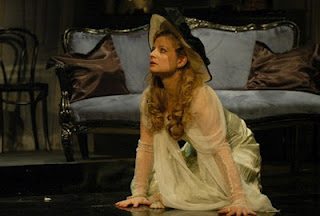 |
| Anders Ekborg, Rolf Skoglund and Tommy Körberg. (Photo source: tommykorberg.se) |
There's a synopsis in English in Stacy's Musical Village. The script has been rather heavily re-written, and some songs have been cut and some have been moved and given to a different character. Everything happens in Merano during four days. The first act works quite well and ends with Anatoly defecting to the US in Florence's company, but the second act consists mostly of people telling each other what they think about the situation, and the story doesn't really progress anymore. The second at is quite scattered and there are pointless reprises that make the story drag quite a lot ("Merano" and "Story of Chess", for instance).
 |
| Josefin Nilsson & Helen Sjöholm. (Photo source) |
The production has simplified the whole complex relationship mess quite a lot and made the characters a lot more black-and-white, and I find it quite sad. The production is more show-centered and more megamusical-like in the negative meaning of the word, and it concentrates mostly on the love affair between Anatoly and Florence. They talk a lot about their feelings and childhood and whatnot, and the lyrics are far less complex than in English (or in Hungarian). Also Molokov has gotten an angst song of his own, telling Anatoly how he had to sacrifice his great love to serve the USSR. Freddie spends most of his time drunk.
But the visuality! I love it. Not so much the costumes or wigs that look quite shabby, but the sets and lights are gorgeous especially in the first act. The stage is big but they use it well; it doesn't feel empty or like set pieces were there only to fill the empty space. The "chess squares" in the background are an excellent idea, showing a half-made-puzzle like photo of Moscow etc. They don't show all, they just give you the idea of the surroundings and atmosphere of the scene.
Like "Where I Want to Be". Anatoly travels by metro, and while I know that an average Hungarian theatre would have built an authentic-looking metro and it's station on the stage, the Swedes show that all you need for a metro is a bunch of people standing huddled together - and the result looks much better. (I have a problem with the Budapesti Operettszínház that has the habit of filling the stage with too much set pieces and props and ensemble, so anything minimalistic and stylish tends to make me overjoyed.)
This video summarizes pretty well everything I like in the Swedish production:
I also adore the orchestrations. I don't know what they do there because I'm no music professional, but the orchestrations feel fresh, light and still deep and full. Minimalistic but complex on the same time. The musicbox-like theme in some of the songs is hypnotizing. There's no cast recording of the 2010 Hungarian concert production, so the Swedish cast recording is the one I mostly listen to. Especially the instrumental parts are heartbreakingly beautiful.
The singers are awesome, and I like their acting, too, though I don't always agree with the way the characters are directed. I'm very picky with female voices, and if I can choose a solo album, I usually prefer to listen to baritones because they somehow tend to be most pleasant to my ears. Helen Sjöholm has a clear, strong and lovely voice, though. No shouting, no screaming, nothing nasal; the voice sounds effortless and pure. Tommy Körberg is one of my favourite Anatolys out there, too, both voice- and acting-wise.
Rolf Skoglund as the Arbiter is rather... unique. I absolutely prefer other Arbiters, but there's something so twisted and weird in Skoglund's Arbiter that despite my dislike I can't help being a bit fascinated by him. He's pretty much the comic relief of the production, though not in the most typical way. The Arbiter's orchestrations are like he: over-the-top, weird and twistedly humorous.
Conclusion: there are things I absolutely adore, like the audiovisuality, and things I'm not fond of, like the storyline and way the characters are shown. I like to listen and watch the Swedish production, but as a theatrical piece telling a story it has its faults, especially in the second act.














